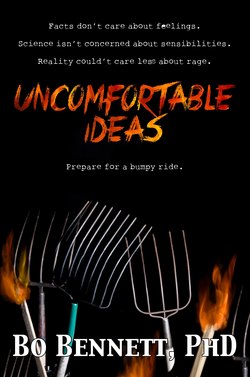Читать книгу Uncomfortable Ideas - Bo Bennett PhD - Страница 20
На сайте Литреса книга снята с продажи.
Unconscious, Group Avoidance
ОглавлениеUnconscious, group avoidance occurs when two or more people shelter themselves and/or others from uncomfortable ideas without realizing it. This kind of avoidance is demonstrated in the creation of social norms.
If one were asked to provide a few examples of racists and racists acts just ten years ago, the answers would be very different then the answers given today. Ten years ago, one might say that a KKK member is an example of a racist, and stating that Japanese Americans should “go back where they came from” would be considered an act of racism. Today, one might say that Ellen DeGeneres is an example of a racist and having yourself photoshopped getting a piggyback ride from the fastest man in the world (who happens to be black), is an act of racism. This change is due to changing social norms.
Uncomfortable Idea: Racism, sexism, and bigotry are evaluations based on social norms. America is becoming more racist, sexist, and bigoted not because of changing behavior, but because of changing social norms and perception.
Defined within social psychology, racism requires the belief in the superiority of one’s own race.14 Today, however, through years of incremental and mostly unconscious processes, the definition of racism has been redefined (in the minds of the public) to include unconscious preferences for people who look like us15 (academically known as implicit bias), criticism of any person of color despite the criticism being unrelated to their race, agreeing with racists on non-racist issues, eating a taco on Cinco De Mayo16, and dressing like a person from another culture on Halloween. All these “displays of racism” may just be prejudicial, discriminatory, culturally insensitive, bad political decisions, or none of the above. Regardless, the moment we attach the label “racist” to them, we stigmatize them to the extent where even discussing the innocence of the ideas becomes an act worthy of being “racist.” Social norms say that we can entertain ideas that might be prejudicial, discriminatory, and even culturally insensitive, but not “racist” ideas. Those are ideas we want to avoid appearing to support or even defend in any way.
Uncomfortable Idea: Your use of the term “racism” is almost certainly inaccurate. Racism requires the belief in the superiority of one’s own race.
When we romanticize, we make something seem better or more appealing that it actually is. Think of the dozens of movies and television shows you have seen where the protagonist is faced with a decision: to keep his high-paying job where he will be away from his family for five days each week, or quit and spend lots of time with his family. We all know the ending. He quits his job, and we see the whole family spending some quality time together as happy as can be. Did you ever ask, “then what happens?” The kids eventually have to go to school, the wife has to take care of the kids, and now the father is unemployed at home all day binge watching ‘80s sitcoms on Netflix. The father becomes a miserable bastard with an alcohol problem; his wife leaves him, and his kids never want to see him again. The end. Admittedly, my ending is unlikely, but not any more unlikely as the romanticized endings we see on film. The reality is most often somewhere in the middle. Through expressions of culture such as movies, television, books, stories, poems, religious parables, anecdotes, and aphorisms, we unconsciously and automatically accept romanticized versions of ideas as truth. Following are some other examples of romanticized ideas. As you read this list, imagine a scene playing out describing the idea. Does it make you feel all warm and fuzzy inside? Realize that how the idea makes you feel is more of a function of the value a culture puts on the idea than any inherent goodness in the idea.
•Couples should stay together for life
•Love is always a beautiful thing
•Faith is good to have
•There is a perfect someone for everyone
•Anyone can succeed in life if they just try hard enough
•The Constitution is a blueprint for a perfect nation
•God is perfectly good as is all the advice in the Bible
•People deserve what they get in life
•Giving money to beggars is the kind and right thing to do
